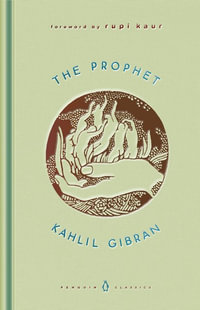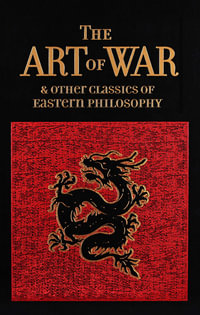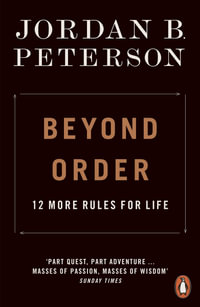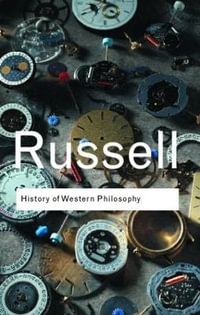
What is this thing called Philosophy of Language?
By: Gary Kemp
Hardcover | 22 December 2017 | Edition Number 2
At a Glance
260 Pages
New edition
24.41 x 16.99 x 1.6
New Edition
Hardcover
$459.25
or 4 interest-free payments of $114.81 with
orAims to ship in 10 to 15 business days
Philosophy of language explores some of the most abstract yet most fundamental questions in philosophy. The ideas of some of the subject's great founding figures, such as Gottlob Frege, Ludwig Wittgenstein and Bertrand Russell, as well as of more recent figures such as Saul Kripke and Hilary Putnam, are central to a great many philosophical debates to this day.
In this clear and carefully structured introduction to the subject Gary Kemp explains the following key topics:
- the basic nature of philosophy of language, its concepts, and its historical development
- Frege's theory of sense and reference; Russell's theory of definite descriptions
- Wittgenstein's Tractatus, Ayer, and the Logical Positivists
- recent perspectives including Kripke, Kaplan and Putnam; arguments concerning necessity, indexicals, rigid designation and natural kinds
- The pragmatics of language, including speech-acts, presupposition and conversational implicature
- Davidson's theory of language, the 'principle of charity', and the indeterminacy of interpretation
- puzzles surrounding the propositional attitudes (sentences which ascribe beliefs to people)
- Quine's naturalism and its consequences for philosophy of language.
- The challenges presented by the later Wittgenstein
- Contemporary directions, including contextualism, fictional objects and the phenomenon of slurs
This second edition has been thoroughly revised to include new key topics and updated material. Chapter summaries, annotated further reading and a glossary make this an indispensable introduction to those teaching philosophy of language and will be particularly useful for students coming to the subject for the first time.
Industry Reviews
'This book is an outstanding pedagogical tool, which will be useful to anyone looking to gain a foothold in the subject. The second edition, which features new chapters on key figures, prominent topics, and recent developments in the field, is a substantial and welcome development of the excellent first edition.'
Brett Sherman, University of South Carolina, USA.
'Will become the standard textbook for survey courses in the philosophy of language'.
Ernest Lepore, Rutgers University, USA.
Praise for the first edition:
'To my mind this is the best introductory textbook for undergraduates looking to get a feel for the subject, without getting bogged down in advanced technical details. Gary Kemp covers all the traditional topics in the field and presents them in an accessible, engaging, and always rigorous style. Appended to each chapter are useful historical notes, a summary, a few questions, and some bibliographical recommendations for further research - a complete set of study aids that ought to be welcomed by students and teachers alike.' - Stefano Predelli, University of Nottingham, UK
'An easy, step by step journey through the classic themes of twentieth-century philosophy of language.' - Francois Recanati, Institut Jean Nicod, France
'Kemp has written a genuine introduction to the philosophy of language with beginning students in mind. Focusing on the issue of the meaning of natural language, he begins with a naive and, for students, very natural view of linguistic meaning. He then motivates and explains the distinctions, problems, solutions and development of the philosophy of language with the patience and understanding of a master teacher.' - Michael Losonsky, Colorado State University, USA
List of figures and tables Preface Introduction 1 eight preparatory notes 2 cognitive meaning and expressive meaning 3 meaning and force 4 context-dependence 5 the roles of propositions 6 compositionality, structure and understanding note
1 Naive semantics and the language of logic 1 naive theory: singular terms, predicates and reference 2 truth and meaning for atomic sentences 3 logical syntax and logical operators historical notes chapter summary study questions primary reading notes
2 Fregean semantics 1 two problems for naive semantics 2 the sense-reference distinction 3 the distinction extended 4 compositionality again; the reference of a sentence 5 applying the theory 6 substitutivity and extensionality 7 the analysis of propositional attitudes 8 the objectivity of sense 9 predicate reference and the concept horse problem 10 further discussion: the context principle historical notes chapter summary study questions primary reading secondary reading notes
3 Russellian semantics 1 the task for russell 2 the theory of definite descriptions 3 Applying the theory of descriptions 4 names as disguised definite descriptions 5 knowledge by acquaintance and knowledge by description historical notes chapter summary study questions primary reading secondary reading notes
4 Russell's Theory of Judgement, The Early Wittgenstein, and Logical Positivism
propositions, facts, and russell's theory of judgement
The Tractatus Logico-Philosophicus
verificationism i: ayer
verificationism ii: carnap's logical empiricism
the vienna circle and the protocol debate historical notes chapter summary study questions primary reading secondary reading notes
5 Kripke on naming and necessity 1 necessity, possibility and possible worlds: a primer 2 the descriptivist paradigm 3 kripke's objections to the description theory of proper names 4 rigid designation 5 fixing the reference i: causal chains 6 fixing the reference ii: descriptions 7 lingering issues from russell and frege 8 further discussion: intensional semantics historical notes chapter summary study questions primary reading notes
6 Context dependence, indexicality and natural kinds 1 indexicals and demonstratives 2 putnam on natural kind terms and essence 3 is meaning in the head? 4 the actual world as a context 5 two-dimensionalism: context of utterance versus circumstance of evaluation 6 further discussion: rigid designation again 7 the indispensability of indexicals 8 indexicals and fregean sense historical notes chapter summary study questions primary reading note
7 Pragmatics 1 mood and force revisited 2 speech act theory 3 implicature 4 some applications of the concept of implicature 5 presupposition; strawson's and donnellan's objections to russell's theory of descriptions 6 metaphor historical notes chapter summary study questions primary reading secondary reading note
8 The propositional attitudes 1 extensionality revisited 2 referential opacity and frege on the attitudes 3 further discussion: multiple hyper-intensional embedding 4 de re and de dicto necessity 5 de re and de dicto belief 6 ralph's predicament 7 belief attributions and explicit indexicals; belief de se 8 an implicit indexical element 9 direct reference, the attitudes, and the semantic de re historical notes chapter summary study questions primary reading notes
9 Davidson's philosophy of language 1 methodology 2 the general form of a theory of meaning 3 the exact form of a theory of meaning 4 the empirical confirmation of a theory of meaning: radical interpretation 5 the principle of charity and the interdependence of belief and meaning historical notes chapter summary study questions primary reading secondary reading notes
10 Quine's philosophy of language 1 quine's naturalism 2 the jungle linguist 3 indeterminacy 4 meaning and analytic truth 5 the argument of `two dogmas of empiricism' 6 quine proposes replacement, not analysis 7 the place of naturalism historical notes chapter summary study questions primary reading secondary reading
11 The Late Wittgenstein 1 language games 2 family resemblance, tools and cities 3 to follow a rule i 4 to follow a rule ii 5 private language historical notes chapter summary study questions primary reading secondary reading 12 Modern directions
assertion
context-relativity
fictional objects
inferentialism
slurs chapter summary study questions primary reading secondary reading Glossary Bibliography Index
ISBN: 9781138225817
ISBN-10: 1138225819
Series: What is this thing called?
Published: 22nd December 2017
Format: Hardcover
Language: English
Number of Pages: 260
Audience: College, Tertiary and University
Publisher: Taylor & Francis Ltd
Country of Publication: GB
Edition Number: 2
Edition Type: New edition
Dimensions (cm): 24.41 x 16.99 x 1.6
Weight (kg): 0.62
Shipping
| Standard Shipping | Express Shipping | |
|---|---|---|
| Metro postcodes: | $9.99 | $14.95 |
| Regional postcodes: | $9.99 | $14.95 |
| Rural postcodes: | $9.99 | $14.95 |
How to return your order
At Booktopia, we offer hassle-free returns in accordance with our returns policy. If you wish to return an item, please get in touch with Booktopia Customer Care.
Additional postage charges may be applicable.
Defective items
If there is a problem with any of the items received for your order then the Booktopia Customer Care team is ready to assist you.
For more info please visit our Help Centre.























